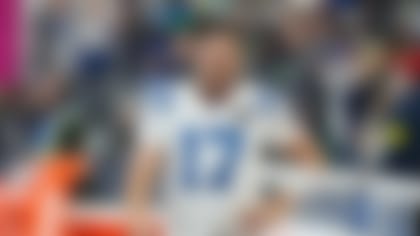With the 2011 season in the rearview mirror, it's time for NFL.com's annual "Exit Interviews," a chance to review the ups and downs of each team's past season and spin it forward.
2011 in a Nutshell: Tennessee was a surprise player in the AFC South, and at 9-7 nearly snuck into the playoffs. The scoring defense was among the league's best and the durability and effective play of quarterback Matt Hasselbeck allowed first-time head coach Mike Munchak to field a competitive team. They're probably still regretting a late-season loss to the Colts, which could have been the difference between them and a wild-card berth.
What Went Right: Hasselbeck had his best season since 2007 after being acquired as a tutor for first-round pick Jake Locker. Locker showed promise in limited action and should push Hasselbeck for the starting job in 2012. Hasselbeck threw for 3,571 yards and 18 touchdowns with 14 interceptions while learning new offensive coordinator Chris Palmer's system and despite missing stud wideout Kenny Britt (torn ACL) after Week 3. Hasselbeck leaned on receivers Nate Washington and second-year man Damian Williams and helped tight end Jared Cook finally emerge. Tennessee finished 12th in the NFL with 245 passing yards per game, marking a shift in identity for the team, which had utilized a run-first scheme under longtime former coach Jeff Fisher.
Defensive coordinator Jerry Gray put together a gritty group that was among the top in the NFL in scoring defense (19.8 points per game). The Titans defense lacks a star, but its collaborative effort kept Tennessee in contention until the very end. Reserve rookie defensive tackle Karl Klug was a big surprise against the pass, registering a team-high seven sacks with two forced fumbles.
Munchak also gets credit for keeping his team focused through the early season holdout of running back Chris Johnson and the season-ending injury to Britt.
What Went Not So Right: CJ2(MakeThatBarely1)K. After holding out and finally getting a hefty contract, Johnson finished with 1,047 rushing yards and four touchdowns. Those are good numbers for most starters, but not for a stud like Johnson. He had just four 100-yard rushing games and his longest run of the season was 48 yards -- somewhat paltry by Johnson's high standard. He showed none of the home-run splash we'd grown used to, a sign that maybe the lockout and his holdout combined to throw a piano on his back. Johnson is not solely to blame. He only carried the ball 20-plus times in five games (and went over 100 yards in four of them). The shift in philosophy under Palmer affected Johnson significantly. The offensive line also suffered a drop-off in performance from previous years, especially in the interior.
Defensively, it's never good when your top four tacklers are defensive backs (cornerback Jason McCourty had 104 stops).
Offseason Crystal Ball: Cornerback Cortland Finnegan is a free agent and could be on the move. The Titans have some good young corners with McCourty and Alterraun Verner, but neither is as competent as Finnegan. The Locker-Hasselbeck situation also could get interesting; Locker's performances last season give one every reason to believe that he could challenge as the starter. Hasselbeck has faced upstarts before, though, and won't go quietly.
Team Needs and Draft: Upgrading the interior of the offensive line is priority No. 1. The Titans could look to center or guard early in the draft or in free agency. At least one pass rusher also is needed. Defensive end Derrick Morgan is a hard worker, but he was drafted to get to the quarterback, and he only produced 2.5 sacks. If the Titans are going to throw more, they must add depth at receiver.
Follow Steve Wyche on Twitter @wyche89.



